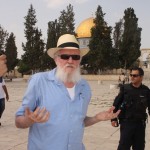Monday, December 28, 2015, 18:14 The Jerusalem District Court accepted an appeal filed by Honenu and canceled the order banning Yehuda Etzion from the Temple Mount. Judge Ram Winograd leveled strong criticism against the police for their treatment of Jews on the Temple Mount.
Etzion was detained on December 22 (the Tenth of Tevet according to the Hebrew
calendar) for raising his arms while walking on the Temple Mount. Another Jew who ascended the Temple Mount with Etzion was detained. According to the policemen, the detainee told them that he would not follow their stringent orders concerning where he could stop and where he could walk on the Temple Mount. After interrogation both detainees were released and summoned to a deliberation at the Jerusalem Magistrate Court on a demand by the police that they be banned from the Temple Mount for a long period of time. At the deliberation on December 24, Jerusalem Magistrate Court Judge Gioia Skappa-Shapiro ordered that Yehuda Etzion and the other Jew who was detained with him be banned for 15 days from entering the area of the Temple Mount.
In her appeal on the ban, Honenu Attorney Sinaiya Moses-Harizi, who represented both detainees at the December 24 deliberation, wrote that raising one’s arms while walking in a holy site, such as the Temple Mount, is an expression of the fear of Heaven, and pleaded that her clients had not committed any violations. Judge Winograd canceled the order placed on Yehuda Etzion by Jerusalem Magistrate Court Judge Gioia Skappa-Shapiro. Judge Winograd determined that in the photographs and the video clip presented to him, it is apparent that during a visit prior to the one during which he was detained, policemen on the Temple Mount did not prevent Etzion from walking with his arms raised and therefore his detention involves a new order which the police have not publicized. “If the police had intended to change the rules of conduct in effect on the Temple Mount, they were obligated to do so formally,” wrote Judge Winograd.
Judge Winograd also severely criticized the conduct of the police towards Jews on the Temple Mount and said that according to the method used by the police it is also forbidden to wear a kippa or to raise one’s eyes towards the sky on the Temple Mount.
“Under the circumstances there is no need to rule on the question of whether or not raising one’s arms constitutes an act of prayer. It is sufficient that the police have not forbidden the act until this time,” wrote Judge Winograd. “I will note that walking in such a manner [with arms raised and palms facing up], perhaps in the spirit of of the verse in the first chapter of Yeshayahu [Isaiah 1:15], supposedly necessitates the same verdict as raising one’s eyes upwards, on the basis of what is written in the Mishnah in Tractate Rosh HaShanah, Chapter 3, and perhaps there is a need to also forbid wearing a head covering on the Temple Mount, because according to what is stated in the Talmud such clothing indicates a fear of Heaven. Indeed, this is a slippery slope, and each step must be carefully weighed.”
Nonetheless, Judge Winograd ruled that the second appellant, who was detained with Etzion, told the policemen that he would not obey their orders, and therefore the judge rejected the appeal on his case and left standing his ban on entering the Temple Mount.
After the ruling Yehuda Etzion said that, “From the beginning it was obvious to me that even according to the shameful status quo which prohibits Jews from praying on the Temple Mount, there was nothing forbidden in raising one’s arms. With this act I sought to express a connection with the Temple Mount and the One who resides there, and I kept in my memory also the prayer of King Solomon, who spread his palms upwards. I regard this ruling as an important act, and I also turn to the Israeli Police to implement it. Allow me to enter the Temple Mount and allow us to walk with our arms raised. And do not make a mockery out of the judge’s ruling as the police have done with other court rulings.”
Honenu: “We are pleased with the acceptance of the appeal which we filed. We hope that the police will learn from the judge’s ruling and stop the hostility towards Jews ascending the Temple Mount. On a daily basis we defend the rights of Jews detained on the Temple Mount through no fault of their own, only because of the improper conduct of the police.”
Honenu Attorney Iris Edri, who represented Etzion during the deliberation on December 28: “We are pleased by the decision to cancel the condition placed on Yehuda Etzion, but regret that the condition placed on the second appellant was not canceled. In our opinion he did not commit any violation.”

